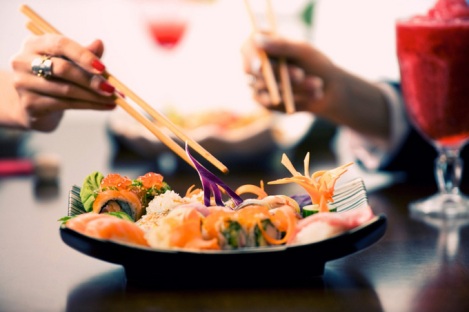
Halal cuisine has become a hot topic in Japan—and not just by coincidence. The Japanese government has set a target of welcoming 20 million visitors annually by 2020, the year Tokyo hosts the Olympic and Paralympic games, and as the economies of Japan’s Asian neighbors continue to grow, travelers hailing from Malaysia, Indonesia, and other Southeast Asian countries possessing large Islamic populations are expected to increase significantly.
According to Japan National Tourism Organization figures, over 176,000 Malaysians traveled to Japan in 2013, an increase of 65% from the previous year, and upwards of 136,000 Indonesians, a rise of 27%, made the trip as well. Japan’s moves to relax visa requirements for travelers from Southeast Asia—home to the world’s largest Muslim population, in Indonesia—will likely push these numbers even higher.
Halal and Washoku Combine
To increase Japan’s appeal in the Islamic world, government and private efforts are under way to gradually increase the number of halal-friendly Japanese eateries. One organization helping Japan open its arms to Muslims is the Malaysia Halal Corporation, a company providing such services as halal certification for restaurants, business seminars, and an online shop where Muslims in Japan can buy halal foods and seasonings.
Restaurants, hotels, and food manufacturers are increasingly looking to Malaysia Halal and similar organizations, such as the Japan Halal Association, to get their menus and products approved. Hanasaka Jīsan, an izakaya (dining bar) near Tokyo’s Shibuya station, decided to provide halal menu options several years back upon request from customers looking to entertain Muslim clients. The establishment turned to Malaysia Halal for certification and now offers a shabu shabu set featuring Japanese beef. Efforts by Hanasaka Jīsan and other establishments are providing increasing opportunities for Muslim travelers to relax and enjoy washoku in authentic Japanese surroundings.
Eateries deciding to become more Muslim-friendly have to consider the extra financial burden, such as certification fees and the cost of specialized utensils and ingredients. Unsurprisingly, many decide not to make the leap to a fully halal menu. Those that do are often found in areas with higher concentrations of Muslim travelers, such as airports and hotels. Tokyo’s Narita airport has two shops featuring halal menus, one serving udon noodles and another tempura. In Kyoto, Hotel Granvia, which sits atop Kyoto Station, offers a halal menu at its Japanese restaurant Ukihashi. Similar to many Muslim-friendly establishments, however, it requires reservations several days in advance, presumably to allow time to procure the necessary ingredients. Finding restaurants that can safely serve Muslim customers is expected to gradually become easier as the number of shops grows.
More Than Just Dining Out
Restaurants are not the only businesses looking to jump on the halal bandwagon. As Japan ages and its domestic market shrinks, food manufacturers are seeking to market their products globally, including to the world’s billion-plus Muslims. Recent stories in the news have highlighted efforts by rice growers, Japanese seasoning makers, and traditional wagashi confectioners to break into the halal food market, with more entrepreneurs expected to follow suit.
This push toward halal is also providing new domestic business opportunities, with a growing number of online vendors and meat producers now selling domestically produced halal products.
*This excerpt of an article was originally published on nippon.com on 23 September 2014. Read the original article here.
